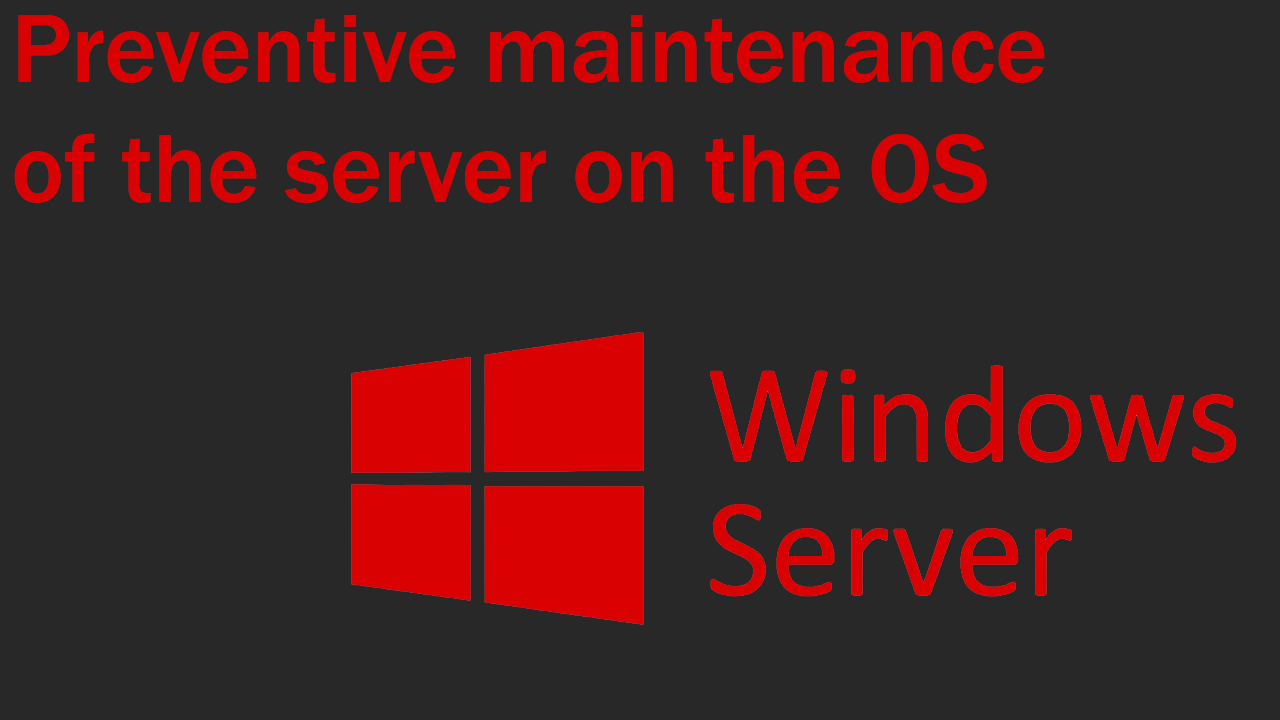Server prevention on Windows Serves

introduction
A very important point for the correct operation of the server is its timely prevention and troubleshooting. Earlier we talked about how to monitor the server performance and how to receive notifications in case of errors. Now we will talk to you about how to serve
What should I do on my own, and what should I set up for automation? In fact, everything is quite simple.
- System updates - They should be performed independently, because the server will restart after the update, which may cause problems.
- Data archiving - It should be done automatically because this will allow you not to worry about the data and not do it manually every time.
- System monitoring - It is worth performing both in real time and collecting data automatically. This will help you get more information about the server at various intervals.
- Scheduled reboot - Windows needs to be rebooted so that it can both update the system and clean itself. This should be done once a month.
- Antivirus inspection - A complete inspection of the system should be carried out to avoid possible infection and other things.
- Disk defragmentation - It is important to defragment from time to time in order to increase the disk read speed and, accordingly, the server response speed.
All these points will help you keep your server safe. Now we will analyze each item in a little more detail.
Detailed description
System Updates
By default, system updates are enabled on every Windows system. This can be a big problem for you because the server may start downloading updates and this will affect its operation. Also, the system usually restarts after downloading an update, which is why your server will simply stop working for a while (Usually this is the time of restarting + installing updates). That is why you should disable the ability to automatically update the system and conduct it yourself. It is best to update the system during non-working hours, for example, at night or on weekends.
Data archiving
You can do it manually or automatically. Everyone does as it is more convenient for him, but it would be reasonable to backup data automatically and carry it out manually only in extreme cases. Thanks to this, you will not have to worry that at some point in time you will lose data and have not made a backup.
System monitoring
It will allow you to constantly be aware of what is happening with your server and what its status is. For example, you can always track the readings of your system in real time. This way you can always know what needs updating and what you should pay attention to.
Thanks to the data collector, you can get information on a specific parameter at any time. For example, there is a heavy load on the server at night, but you don't understand why. In this case, you can launch a data collector, which will send you a notification when a certain percentage is exceeded, or launch another data collector.
This way you can get data on your system at any time.
Scheduled reboot
Windows should be restarted from time to time. This should be done so that the system works faster and there are no errors. For example, you are servicing a Windows Server and it suddenly began to lose power and over time it became unbearable to work with it. There may be many reasons for this, but one of the main ones is that your server has not been rebooted for a long time. To check if this is the case, you should reboot it and then it will become clear that this is a software problem or you should pay attention to the hardware.
This is not done so often and once a month is quite enough.
Antivirus inspection
It should be done at least once a month and preferably during non-working hours. For example, at night you can run a full scan of the server with an antivirus and by morning it will be completed (Depends on the amount of memory.) Sometimes it's better to run a server inspection from Friday evening so that everything can be checked for sure over the weekend.
This can be called a necessity, since sometimes a real-time antivirus can miss some infected file and it will be hidden deep in the system. Therefore, a full-fledged server check is carried out, during which it is possible to find deeply hidden infected files. You should also use several antivirus programs to check the system. This needs to be done because sometimes one antivirus program will not be able to detect the problem, and several programs significantly increase the chance of detecting and fixing the problem.
Disk defragmentation
Disk defragmentation should be performed at least once a month (preferably once every two weeks). This will allow your system to run faster, longer, and you can be sure that users will not complain about the speed of command execution.
Conclusion
In this article, I have provided you with information about preventive measures that should be carried out with a certain frequency. This will allow your system not to let you down and work for a long time. Each system administrator should make a plan for himself to carry out preventive maintenance and follow it. Thanks to this plan, the server / site will be available 24/7 with high speed and without a chance of system infection or unexpected shutdown.
You can read the article about viruses and antiviruses here.

